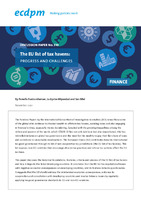The EU list of tax havens: progress and challenges

com document
Συγγραφέας
European Centre for Development Policy Management (
Eunice, Pamella
Miyandazi, Luckystar
Bilal, San
Ημερομηνία
2021-11Προβολή/
Θεματικές επικεφαλίδες
Finance ; Non-cooperative tax ; Economic development effectsΠερίληψη
Following the release of the Panama papers in 2016, the International Consortium of Investigative Journalists (ICIJ)
has now published the Pandora papers. The latter reveals how some of the world’s powerful elite continue to
channel wealth to offshore tax havens, not only avoiding taxes but also engaging in financial crimes especially money
laundering (ICIJ 2021). The Pandora evidence comes almost a year into 2021-2030, a crucial and determinant decade
of whether countries will attain the Sustainable Development Goals (SDGs). However, the ongoing coronavirus
(COVID-19) pandemic and its associated socio-economic crisis have threatened the potential of developing countries
to realise sustainable economic transformation.
COVID-19 recovery processes also reveal a great divide between the richest and poorest countries. Sub-Saharan
Africa in particular is expected to experience the slowest growth rate in about two decades whereas advanced
economies are projected to grow at the highest rate in almost 5 decades (Gill and Nishio 2021). The African private
sector has also been greatly exposed to this great recession yet African governments are unable to offer economic
stimuli to protect millions of jobs offered by the private sector (Bilal et al. 2020). Indeed, developed countries possess
a great financial backbone to ‘build back better’ while developing countries are facing serious fiscal constraints,
which have threatened their achievements before the pandemic (Furceri et al. 2021; Furceri et al. 2021a; Agrawal
et al. 2021).
Despite the broad regional inequalities, many large multinational corporations have been able to make significant
profits.1 From March 18 to December 31, the wealth of billionaires increased by US$3.9 trillion as the masses battled
with job losses, business failures, and vaccine shortages (Oxfam 2021). Such a paradox rekindles debates on global
tax governance and creates a need for the well off to pay their fair share of taxes and contribute to sustainable
development. International organisations such as the United Nations (UN), World Bank Group (WBG), International
Monetary Fund (IMF) and Organisation for Economic Co-operation and Development (OECD) have stressed the vital
role of governments in creating effective tax systems to this end (World Bank 2018). The UN has also established a
sustainable tax framework to promote good tax governance and transparency among businesses and organisations.2
The fight against unfair tax practices has also attracted increasing global attention leading to several evaluation
listings, including the OECD list of uncooperative tax havens, European Union (EU) list of non-cooperative tax
jurisdictions (EU list of tax havens) among others.
